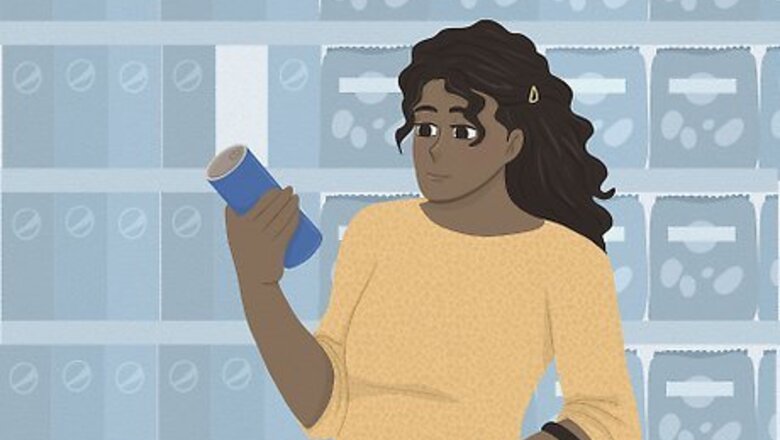
views
- Support businesses with a track record of giving back to impoverished communities, like Kroger, The Home Depot, and Johnson & Johnson.
- Donate to charities dedicated to helping those in poverty. Resources like Charity Navigator can help you find high-quality organizations to donate to.
- Support local food banks in your area by donating groceries.
Support businesses that donate to charity.
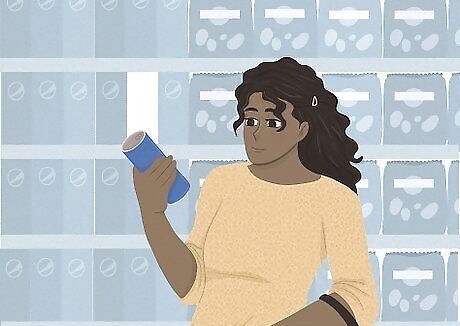
A little research can turn your shopping into meaningful advocacy. Think about some of the stores you shop at the most, be it for groceries, clothing, or other essential items. Then, hit the web and do a little digging into each business—many companies have charitable foundations or initiatives, some of which give back to families and communities in need. A few popular companies/businesses that meet this criteria include: Kroger Pepsi The Home Depot Johnson & Johnson
Give money to reputable charities.
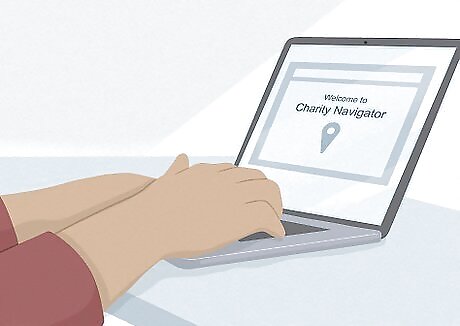
Not all charities and non-profits are created equally. Visit sites like Charity Navigator before signing any checks or making any online donations. With their unique grading system, Charity Navigator lets you know how big of an impact a charity has, as well as how accountable and transparent the organization is overall. According to the site, some of the best charities fighting global poverty to choose from are: Evidence Action Inc Haitian Health Foundation Amref Health Africa Equalize Health Tip: Try to make thoughtful purchases when you go out shopping. Before making an impulse buy, ask yourself if you really need the item. Could that money be better used as a charitable donation?
Donate groceries to local food banks.
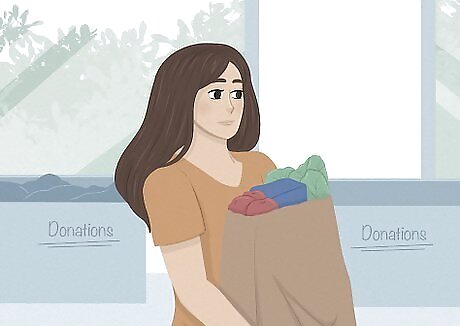
A simple food donation can make a big difference in someone’s life. Have a few extra groceries on hand that you don’t need, or just looking for a simple way to give back? Search online to find the closest food bank in your area, and swing by to donate some groceries. Double-check the food bank’s website ahead of time to see what their donation requirements are, or if they need any specific types of supplies. Not sure where your local food bank is? If you live in the United States, click here. Does your community not have a local food bank? Think about starting one yourself.
Volunteer your time.
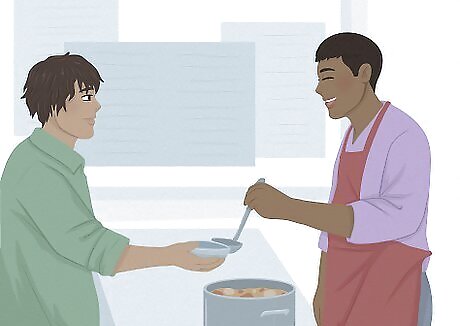
Soup kitchens and homeless shelters are both good options to consider. Want to make the most out of your free time? There are plenty of ways to volunteer your time and labor, whether that’s volunteering at a hospital, donating blood, or helping put together holiday presents for kids in need. You can also: Make meals with groups like Orphan Grain Train or No Kid Hungry Build homes with groups like Habitat for Humanity Help out at a local soup kitchen Volunteer at a homeless shelter
Distribute meal kits to the local homeless community.
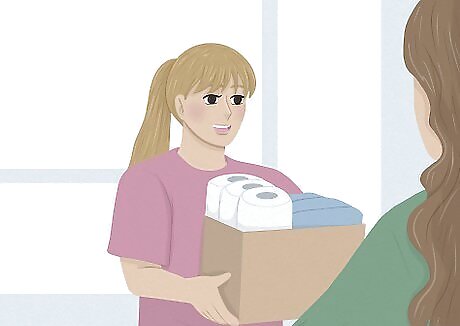
Fill large plastic bags with food, water, and helpful toiletries. Do you live in the city or in an area with a large homeless population? Take some time to put together a helpful “kit”—this could be a large plastic bag filled with supplies that can help an individual experiencing homelessness, like water bottles, peanut butter crackers, a gift card to a fast food restaurant, and more. You can also throw in some toiletries like: Pads and tampons Chapstick Toothbrushes and toothpaste Sunscreen Tissues
Start a fundraiser.

Bake sales, fun events, and contests are all great ways to raise money. Have a lot of spare time on your hands? Take some time to organize a fundraiser or other special event, with all the proceeds going to a charity that helps low-income and impoverished communities (like World Vision, National Urban League, or Feeding America). Here are a few ideas to help you start your own fundraiser: Hosting a collection drive Hosting a dance-a-thon Organizing a charity BBQ Organizing a charity quiz night
Call your government officials.

Government officials can take more direct action to help the poor. In the United States, your local representatives are there to represent you and your local community’s needs. Take a moment to contact this representative and advocate for ways to help some of the less fortunate in your community, like offering free school lunches for low-income families or allowing more affordable housing opportunities for the homeless community. Not sure who your local representative is or how to contact them? Check out this website for more information.
Advocate on social media.
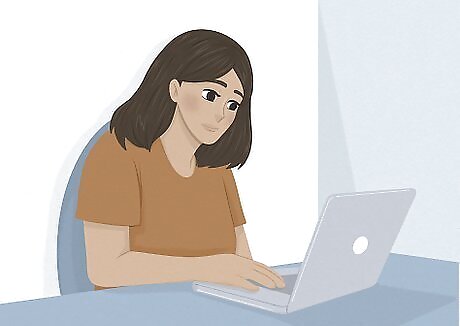
Take time to highlight poverty-related issues on your profile. Is there an issue that’s near and dear to your heart, like children in your community going hungry? Post a relevant news byte or another article about it on your social media profile, along with a blurb on why this issue means so much to you. To really go the extra mile, include a link on how your followers can donate or otherwise make a difference. “I’ve been thinking a lot about some of the low-income families in our community. Did you know that United Way offers healthcare support to families in need?” “As a new mother myself, it breaks my heart to know that some mothers are struggling to provide for their little ones. I’m grateful and relieved to know that charities like Life of a Single Mom and Bridge of Hope are offering support to this vulnerable community.”
Talk about poverty-related issues with others.

See if you can motivate some of the people in your life to take action. One of the best ways to advocate for impoverished communities is to raise awareness—and what better way to do that than by starting a simple conversation? Chat with your friends, relatives, and the other people in your life about communities that need a little extra support, and what can be done to provide a helping hand. Here are a few conversation starters to get you going: “Did you know that about 1 in every 6 kids in America is currently experiencing poverty?” “Did you know that over 15 million Americans are currently making 50% below the poverty level of income?” “I learned recently that over 10% of American families/households don’t have food security.” Angelina Jolie Angelina Jolie, Actress & Humanitarian Live empathetically and help others to the best of your ability "We have a responsibility to be aware of others. We need to make justice the norm, not the exception."
Research and learn more about poverty.

Understanding poverty is a valuable step to help those in poverty. Poverty, be it global or local, is a nuanced issue that spans across a wide variety of cultures and communities. The more you know about and understand poverty, the better ally and advocate you can be for those in need. Here are a few resources to help you get started: Poverty USA (poverty in America) UNICEF (child poverty) World Bank (learning poverty) World Vision (global poverty)




















Comments
0 comment